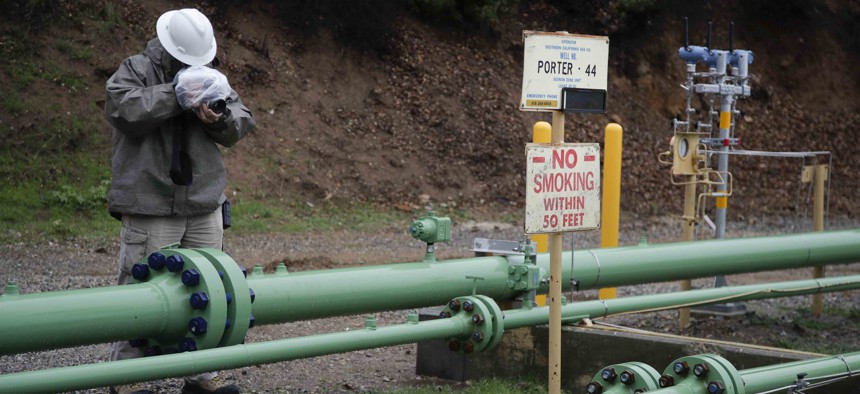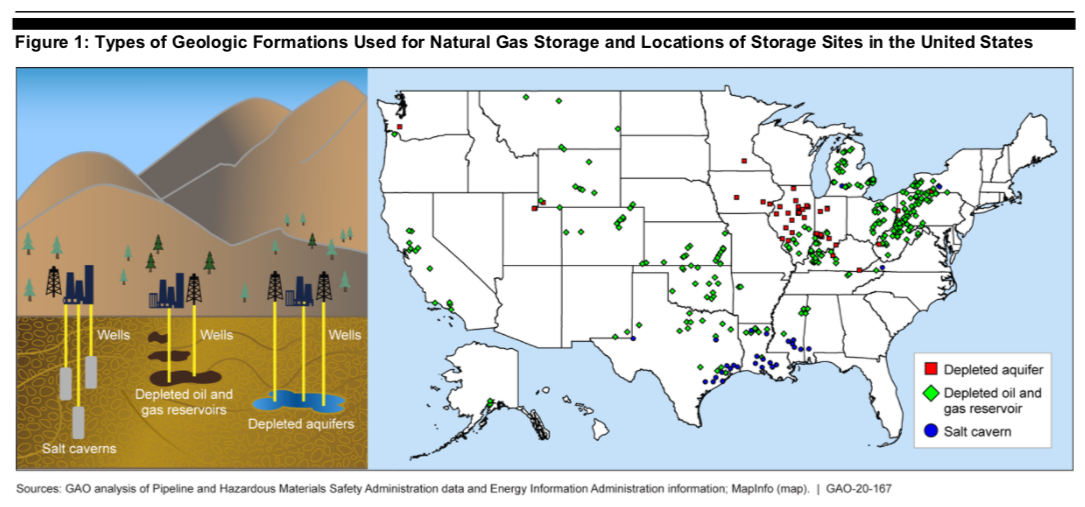States Fail to Step Up for Natural Gas Storage Safety Program

An employee uses an infrared camera to detect a gas leak at the Southern California Gas Company's Aliso Canyon storage facility near the Porter Ranch neighborhood of Los Angeles, Thursday, Jan. 12, 2017. AP Photo/Jae C. Hong
Connecting state and local government leaders
Following a 2015 leak in California, a federal agency took on new responsibilities for inspecting the natural gas sites, but a watchdog says that fewer states than expected are helping.
After a massive leak at an underground natural gas storage site near Los Angeles temporarily drove about 8,000 California families from their homes four years ago, the federal government took action meant to strengthen its oversight of such facilities.
Part of this effort involved the federal agency that regulates the transportation of gas, oil and other hazardous materials setting the goal of inspecting all of the nation’s roughly 400 underground natural gas storage sites within a five-year timeframe.
But a federal watchdog this week said that the Pipeline and Hazardous Materials Safety Administration, or PHMSA, could have trouble meeting this goal, in part because fewer states than expected have partnered with the agency to complete the inspections.
When the 2015 leak occurred at the Aliso Canyon facility in California, federal regulators were responsible for overseeing surface pipelines and other above-ground equipment at natural gas storage sites. The regulation of the underground portion of the sites was left to states.
Natural gas is commonly stored in depleted oil and gas reservoirs, as well as in salt caverns and emptied out aquifers.
These types of sites are located in 31 states. But over half of their storage capacity is in California, Louisiana, Michigan, Pennsylvania and Texas, according to the newly issued report on the federal inspection program from the Government Accountability Office.

Congress passed legislation in 2016 that required the U.S. Department of Transportation to set and enforce minimum safety standards for underground natural gas storage facilities. This responsibility was left to PHMSA, which is part of the Transportation Department.
PHMSA in 2017 anticipated that 25 states eligible to partner with the agency on the inspection program would do so. But as of June only 10 states actually had. GAO explains that as a result the agency is facing an inspection workload that is about 60% greater than it anticipated.
Natural gas leaks can pose health hazards for people, like eye irritation and lung injuries, as well as threats to groundwater. There are environmental risks as well. The Aliso Canyon leak, GAO notes, equaled the emissions from about 529,000 cars driven for one year.
California officials blamed two key factors for contributing to that leak. One was an aging well, which was drilled in 1953. The other was a lack of redundant safety valves at the site.
The leak went on for nearly four months before it was finally brought under control. People living in the area reported health problems like migraines, nosebleeds, nausea, breathing difficulties and dizziness.
GAO says PHMSA data shows that about 10,000 wells at the nation’s natural gas storage sites have similar design features as the faulty well at Aliso Canyon. Other research has found that over 300 cities and populated areas are within three miles of the storage facilities.
The accountability office’s report highlighted a number of reasons why states haven't joined the federal government’s inspection effort.
Some state officials told GAO they didn't partner with PHMSA either because the agency wasn’t offering enough money to cover the costs, or because they needed more time to secure state-level funding.
PHMSA, meanwhile, told the watchdog that some states were holding off deciding whether to partner on the program until final federal rules related to it were issued.
The agency said more states could become part of the effort going forward and indicated that Texas was likely to do so next year.
But GAO said that with only 10 states participating PHMSA would need to increase the number of sites it plans to inspect to 322 from about 200 in order to meet its 2023 deadline of checking out all of the roughly 400 natural gas storage facilities.
PHMSA said in 2018 it completed 35 inspections and partner states conducted 30, for a total of 65. That exceeded the agency’s goal of 41 site inspections for the year. But the number of facilities the agency intends to inspect is set to go up, with a target of 80 sites in 2019.
The agency has requested $8 million for each fiscal year between 2017 and 2019 for its natural gas storage safety program, with about $6 million of that amount going toward grants for states.
California garnered the bulk of the state grant funding in both 2017 and 2018, with PHMSA allotting the state about $3.2 million and $4 million respectively in each of those years.
GAO recommends that PHMSA take a closer look at the factors affecting state participation in the inspection program, as well as the pipeline agency’s own workforce needs.
The watchdog also says the agency’s administrator should set performance metrics that measure improvements in safety at the storage sites, like reductions in problematic incidents.
PHMSA in a written response to a draft version of the report agreed with the recommendations.
Bill Lucia is a Senior Reporter for Route Fifty and is based in Olympia, Washington.

NEXT STORY: How state CIOs manage their expanding customer base



